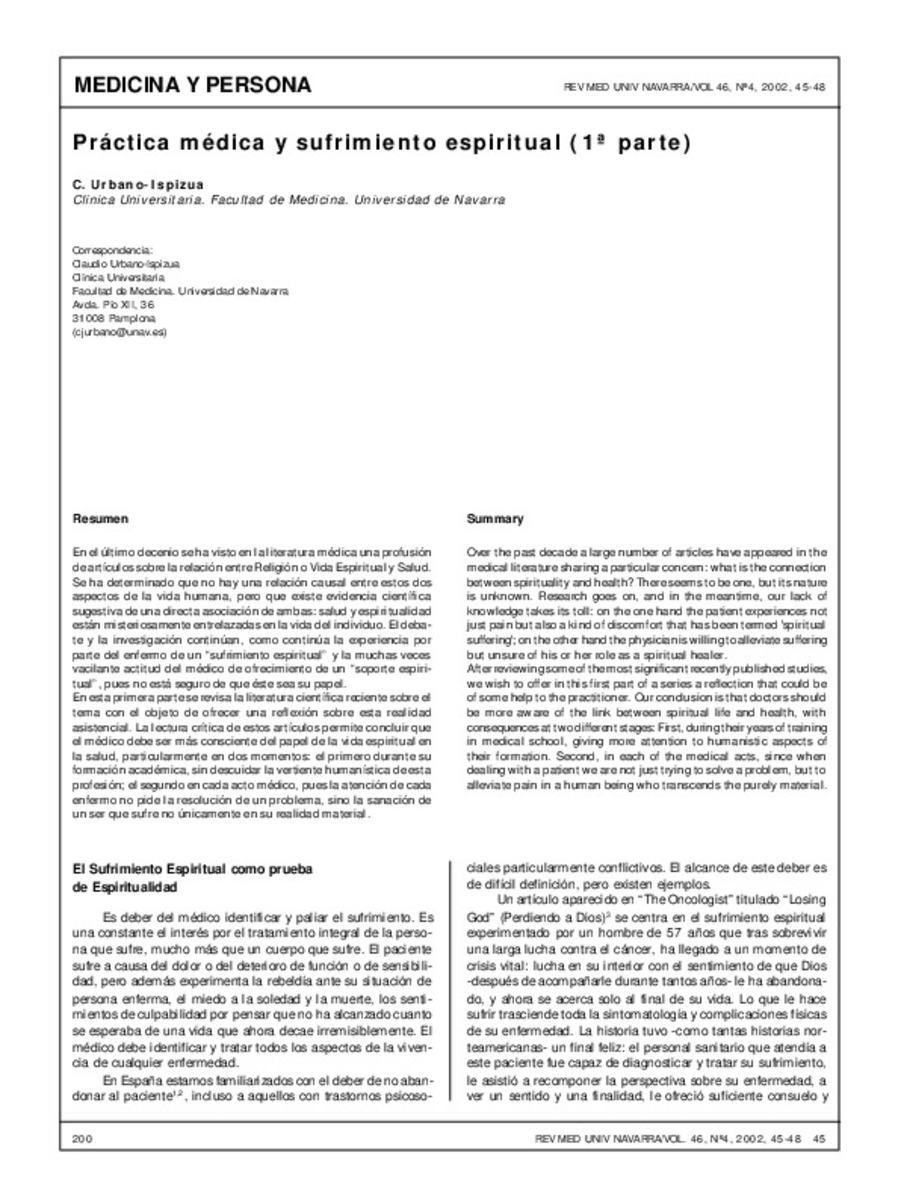Full metadata record
| DC Field | Value | Language |
|---|---|---|
| dc.creator | Urbano-Ispizua, U. (U.) | - |
| dc.date.accessioned | 2015-11-25T11:17:49Z | - |
| dc.date.available | 2015-11-25T11:17:49Z | - |
| dc.date.issued | 2002 | - |
| dc.identifier.citation | Urbano-Ispizua, U. (U.) “Práctica médica y sufrimiento espiritual (1a parte)”. REV MED UNIV NAVARRA/VOL. 46, No4, 2002, 45-48. | es_ES |
| dc.identifier.issn | 0556-6177 | - |
| dc.identifier.uri | https://hdl.handle.net/10171/39451 | - |
| dc.description.abstract | En el último decenio se ha visto en la literatura médica una profusión de artículos sobre la relación entre Religión o Vida Espiritual y Salud. Se ha determinado que no hay una relación causal entre estos dos aspectos de la vida humana, pero que existe evidencia científica sugestiva de una directa asociación de ambas: salud y espiritualidad están misteriosamente entrelazadas en la vida del individuo. El deba- te y la investigación continúan, como continúa la experiencia por parte del enfermo de un “sufrimiento espiritual” y la muchas veces vacilante actitud del médico de ofrecimiento de un “soporte espiritual”, pues no está seguro de que éste sea su papel. En esta primera parte se revisa la literatura científica reciente sobre el tema con el objeto de ofrecer una reflexión sobre esta realidad asistencial. La lectura crítica de estos artículos permite concluir que el médico debe ser más consciente del papel de la vida espiritual en la salud, particularmente en dos momentos: el primero durante su formación académica, sin descuidar la vertiente humanística de esta profesión; el segundo en cada acto médico, pues la atención de cada enfermo no pide la resolución de un problema, sino la sanación de un ser que sufre no únicamente en su realidad material. | es_ES |
| dc.description.abstract | Over the past decade a large number of articles have appeared in the medical literature sharing a particular concern: what is the connection between spirituality and health? There seems to be one, but its nature is unknown. Research goes on, and in the meantime, our lack of knowledge takes its toll: on the one hand the patient experiences not just pain but also a kind of discomfort that has been termed 'spiritual suffering'; on the other hand the physician is willing to alleviate suffering but unsure of his or her role as a spiritual healer. After reviewing some of the most significant recently published studies, we wish to offer in this first part of a series a reflection that could be of some help to the practitioner. Our conclusion is that doctors should be more aware of the link between spiritual life and health, with consequences at two different stages: First, during their years of training in medical school, giving more attention to humanistic aspects of their formation. Second, in each of the medical acts, since when dealing with a patient we are not just trying to solve a problem, but to alleviate pain in a human being who transcends the purely material. | es_ES |
| dc.language.iso | spa | es_ES |
| dc.publisher | Servicio de Publicaciones de la Universidad de Navarra | es_ES |
| dc.rights | info:eu-repo/semantics/openAccess | es_ES |
| dc.subject | Materias Investigacion::Ciencias de la Salud | es_ES |
| dc.subject | Sufrimiento Espiritual | es_ES |
| dc.subject | Espiritualidad | es_ES |
| dc.subject | Pacientes | es_ES |
| dc.subject | Sufrimiento espiritual | es_ES |
| dc.subject | Religión | es_ES |
| dc.title | Práctica médica y sufrimiento espiritual (1a parte) | es_ES |
| dc.type | info:eu-repo/semantics/article | es_ES |
Files in This Item:
Statistics and impact
Items in Dadun are protected by copyright, with all rights reserved, unless otherwise indicated.






